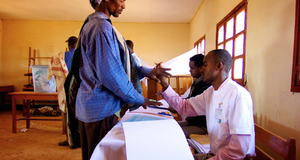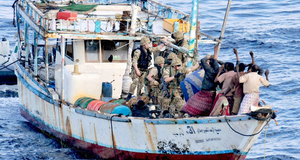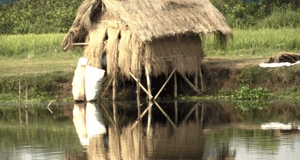Featured Article:State Building in Somalia in the Image of Somaliland: A Bottom-Up Approach
By
2014, Vol. 6 No. 03 | pg. 4/4 | « ConclusionThe history of Somali statelessness is also a history of state building failure by the international community. Using a top down approach to construct western style government institutions in Somalia has not worked for over twenty years. “For many Somalis, the state is an instrument of accumulation and domination, enriching and empowering those who control it and exploiting and harassing the rest of the population” (Menkhaus, 2006, p.87). This kind of perception does not lend itself to the creation of a state apparatus imposed by outside sources. The answer is state building based on the traditional Somali clan system, such as in the example set by “Somaliland’s extraordinary indigenous conflict-resolution methods” which “may provide an example to the southern Somalis” (Jhazbhay, 2003, p.81). If state building in Somalia is “approached from the bottom up, evolving in an organic and irregular manner and using existing Somali social and religious institutions” (Menkhaus, as cited in Leonard and Samantar, 2011, p.576) there may be light at the end of the tunnel for Somalia. Somali state failure has endured for 21 years largely based on a lack of legitimacy of attempted central governments. This stems from a lack of focus by international actors on the unique nature of Somali clan society and politics. Pham asserts: “Although none are likely to risk the loss of face by ever admitting it, the example of Somaliland’s progress by leveraging the strength and resilience of traditional institutions to build a sustainable polity amid the chaos of the former Somalia has not been lost on Somalis in other regions.” (2012, p.23) Somaliland has proven to be the only region within greater Somalia able to effectively form a government. Based on proven local methods the Somaliland experiment has yielded an effective formula for state construction.While clan identity may run counter to modern ideas of citizenship in a Westphalian world, the ideals of clan-society can be conveyed into a stable and successful state model. European state models did a disservice to Africa during the post-colonial period. Badie and Birnbaum see the modern state as “a unique social intervention devised to solve the specific crises of the western European societies at a particular point in their development” (as cited in Barkey and Parikh, 1991, p.529), and therefore not necessarily ideal for other regions at other stages of development. International trade and industrial capacity can be built within Somaliland over time. Michael Van Notten outlines as much in the closing chapter of his book, The Law of the Somalis, where he frames trade centers designed to operate within the boundaries of xeer. “Such traditional development could enable Somalis to assume a respected place in the world by leaving aside their colonial legacy and building on their indigenous institutions” (Lennartz, 2007, p.130). If Somalia is to achieve stability and success the legitimacy of the government needs to come from the Somali people and not from an outside source. After so many failed attempts, evidence from Somaliland suggests that a locally oriented clan-based approach will be the most likely model to succeed in Somalia. ReferencesAnonymous. (2002). Government recognition in Somalia and regional political stability in the Horn of Africa. The Journal of Modern African Studies, 40(2), 247-272. Ahmed, I.I., & Green, R.H. (1999). The heritage of war and state collapse in Somalia and Somaliland: Local-level effects, external interventions and reconstruction. Third World Quarterly, 20(1), 113-127 Barkey, K. & Parikh, S. (1991). Comparative perspectives on the state. Annual Review of Sociology 17, 523-549. Barrett, C., Mude, A. & Omiti, J. (2007). Decentralization and the Social Economics of Development: Lessons from Kenya. Wallingford, GBR: CABI Publishing. Biggar, N. (2002). Peace and justice: A limited reconciliation. Ethical Theory and Moral Practice, 5(2), 167-179. Byrne, M. (2013). The failed state and failed state-building: How can a move away from the failed state discourse inform development in Somalia? Birkbeck Law Review, 1(1), 111-134. Crawford, G. & Hartmann, C. (2008). Decentralization in Africa: A pathway out of poverty and conflict? Amsterdam, NLD: Amsterdam University Press. Debiel, T., Glassner, R., Schetter, C. & Terlinden, U. (2009). Local state-building in Afghanistan and Somaliland. Peace Review: A Journal of Social Science, 21(1), 38-44. Doornbos, M. (2002). Somalia: Alternative scenarios for political reconstruction. African Affairs 101(402), 93-107. Fatton JR, R. (1990). Liberal democracy in Africa. Political Science Quarterly 105(3), 455-473. Ferguson, N. (2002). Empire: The rise and demise of the British world order and the lessons for global power. New York: Basic Books. Garcia, M.R. & Sunil, A. (2008). Achieving better service delivery through decentralization in Ethiopia. Herndon, VA: World Bank Publications. Gordon, A.A. & Gordon, D.L., (2012). Understanding contemporary Africa 5th ed. London: Rienner Publishers. Jhazbhay, Iqbal. (2003). Somaliland: Africa’s best kept secret, a challenge to the international community? African Security Review 12(4), 77-82. Kaplan, S. (2008). The remarkable story of Somaliland. Journal of Democracy, 19(3), 143-157. Kibble, S. (2001). Somaliland: Surviving without recognition; Somalia: Recognized but failing? International Relations, 15(5), 5-25. Lennartz, N. (2007). [Review of the book The law of the Somalis: A stable foundation for economic development in the Horn of Africa by Michael Van Notten]. Journal of Libertarian Studies, 21(2), 129-133. Leeson, P.T. (October 27, 2007). Better off stateless: Somalia before and after government collapse. www.peterleeson.com. Retrieved from http://www.peterleeson.com/Better_off_Stateless.pdf Leonard, D.K. & Samantar, M.S. (2011). What does the Somali experience teach us about the social contract and the state? Development and Change, 42(2), 559-584. Lutter, M. (April 21, 2011). The Law of the Somalis (Review of the book The law of the Somalis: A stable foundation for economic development in the Horn of Africa by Michael Van Notten]. Retrieved from: http://athousandnations.com/2011/04/21/the-law-of-the-somalis/. Malvezzi, A. (1927). Italian colonies and colonial policy. Journal of the Royal Institute of International Affairs, 6(4), 233-245. Menkhaus, K. (2006). Governance without government in Somalia: Spoilers, state building, and the politics of coping. International Security, 31(3), 74-106. North, D. (1990). Institutions, instructional change and economic performance. New York: Cambridge University Press. Pham, J.P. (2012). The Somaliland exception: Lessons on post-conflict state building from the part of the former Somalia that works. Marine Corps University Journal, 3(1), 1-33. Posner, R. (1980). A theory of primitive society, with special reference to law. Journal of Law and Economics 23, 1-53. Republic of Somaliland Constitution. (2006). Somaliland Government. Retrieved from http://somalilandgov.com/new/wp-content/uploads/2012/06/Somaliland-Constitution-Text-only-Eng-IJ.pdf Republic of Somaliland. (2011). Somaliland national vision 2030. Retrieved from http://somalilandgov.com/new/wp-content/uploads/2012/05/somaliland-vision-2030.pdf Samoff, J. (1980). Underdevelopment and its grassroots in Africa. Canadian Journal of African Studies 14(1), 5-36. University of Texas Somalia’s Clan Families. https://www.lib.utexas.edu/maps/africa/somalia_ethnic_grps_2002.jpg Walls, M. (2009). The emergence of a Somali state: Building peace from civil war in Somaliland. African Affairs, 108(432), 371-389. Suggested Reading from Inquiries Journal
Inquiries Journal provides undergraduate and graduate students around the world a platform for the wide dissemination of academic work over a range of core disciplines. Representing the work of students from hundreds of institutions around the globe, Inquiries Journal's large database of academic articles is completely free. Learn more | Blog | Submit Latest in Political Science |


















